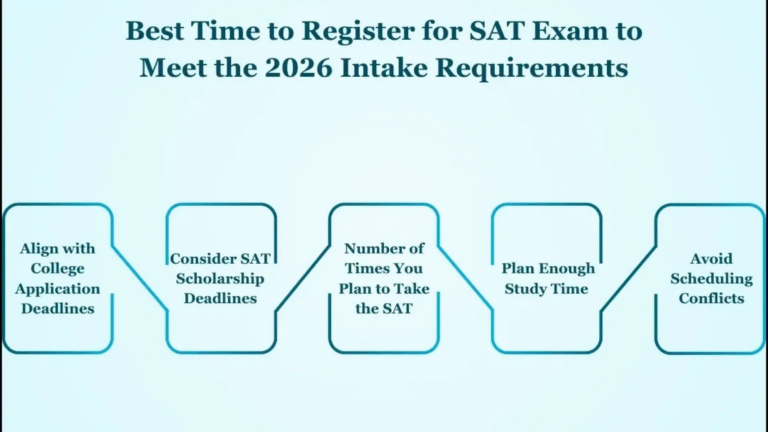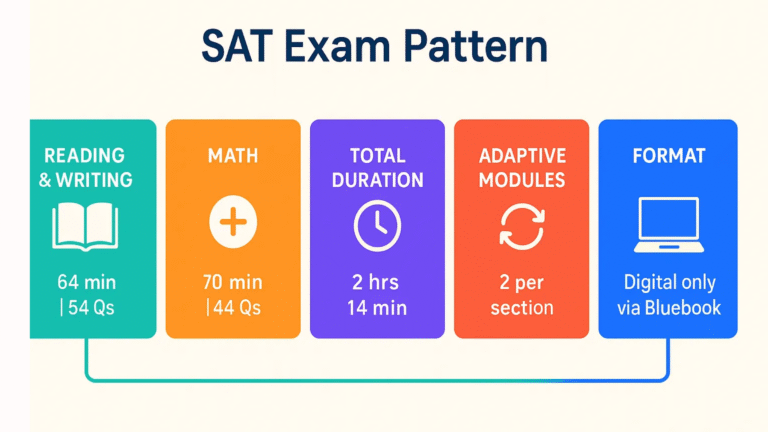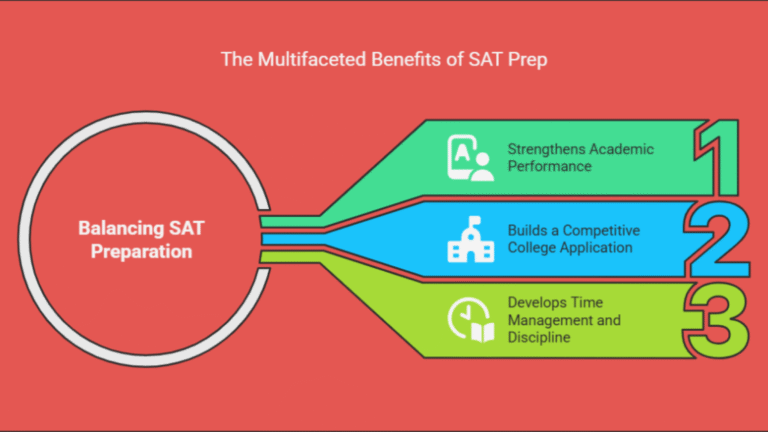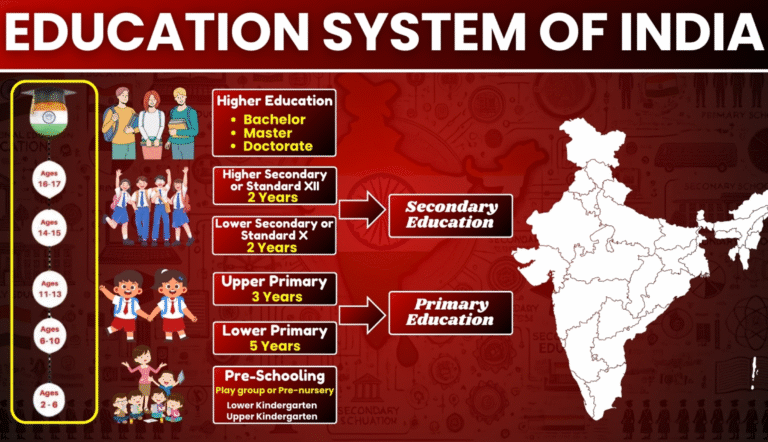Study Abroad Consultants In Delhi
SAT 2026 Preparation in India: How to Balance School and Test Prep

For numerous Indian students, studying abroad is more than just studying abroad; it is about creating a global career path, international exposure and lifetime experiences. Of all the standardized exams that are often required to admit students to their top choices abroad, the SAT is one of the most well-known and easily accepted. However, preparing for the SAT while dealing with challenging school academics can be as exhausting as it sounds. This can be particularly challenging for students in Classes 11 and 12.
Managing a school curriculum and preparing for the SAT requires planning, discipline, and consistency. The objective of this article is to serve as a thorough guide to help Indian students navigate the balance. It includes how to plan out preparation, manage your time, resources and generate a plan of action to develop productive routines to improve your school performance and SAT scores.Lorem ipsum dolor sit amet, consectetur adipiscing elit. Ut elit tellus, luctus nec ullamcorper mattis, pulvinar dapibus leo.
Understanding the SAT Exam
Before we delve into preparation approaches, it is important to understand what the SAT actually tests, and why it is important. The SAT (Scholastic Assessment Test) is a standardized test administered by the College Board to assess a students’ readiness for undergraduate study. It assesses critical reading, mathematical reasoning, and evidence-based writing — all skills that the most prestigious universities generally consider in their applicants.
In India, several of the top global universities including the US, Canada, and Singapore, and some Indian colleges have adopted the SAT under the College Board’s India Global Higher Education Alliance. The College Board has developed the SAT as a standardized test for evaluating international applicants on the same scale.
The SAT 2026 will have the same test structure for the digital test. Which was enacted recently to support streamlined testing for the students. The test will continue to take around two hours and fourteen minutes with adaptive question sets that have a shorter time limit than the paper-based tests.
Understanding this structure is important because it will help students create a plan of preparation. That can accommodate their studies with their schools, and not induce more stress on the students in preparation.

The Challenge of Balancing School and SAT Prep
The students in India operate in a distinct academic environment. As students chase board exams with the heavy course load of CBSE, ICSE, IB or State Boards. It can be quite difficult to juggle schoolwork along with SAT preparation. The school year is full of internal assessments, practical exams, co curriculars and preparation for board exams.
Many students feel overwhelmed as they add SAT prep to their routines. Often, students struggle initially to find time between schoolwork and SAT prep because they think of the SAT entirely on its own academic pursuit. In reality, there’s a great deal of overlap between the analytical skills needed to take the SAT. The skills developed in these school subjects, particularly for English and Mathematics.
Success comes through integration rather than separation. With a little bit of thought, it’s possible to balance both and even advocate for the skills being honed through schoolwork to enhance SAT performance.
Learn expert tips to boost your SAT score with smart prep! Read More
Why Start SAT Preparation Early
Advanced preparation in general is often the single biggest advantage for students who do well on the SAT, and the sooner students begin preparing. Say around Class 10 or early Class 11—the more time they will have to solidify foundational skills and refine fundamental strategies over time.
The SAT is a skills-based test, not a memory test. When students leave studying for the SAT until the last minute, they are rarely able to get strong results. However, students who start early can study for smaller, incremental amounts of time consistently, and it will not interfere with their own school progress.
In addition, early exposure to SAT-type questions can help students shift to the test’s reasoning-based thinking. Which is a break from the traditional Indian test that emphasizes rote and memorization. By studying for the SAT over months, students will be able to reason out both school and SAT demands to balance the two demands and avoid studying burnout.
Creating a Balanced Study Schedule
The foundation of working on SAT and planning for school together is a structured study plan. The best students are those students who plan study time week-to-week, in conjunction with school demands.
An effective plan generally looks like one to two hours a day or approximately 10-12 hours a week for SAT practice, depending on what stage they are in their test prep. During busier school periods – for example pre-boards or finals – students may choose to cut the SAT hours temporarily, but the idea is to remain consistent rather than intense.
To best utilize unlimited time, students can use the “integration method” in which they use their school learning to bolster their SAT preparation. For example, reading comprehension of English literature or essays might directly impact reading comprehension scores. As would algebra and data analysis as part of their school math topics, which directly correlate to quantitative reasoning.

Aligning School Curriculum with SAT Preparation
Indian students can take comfort in the fact that there is considerable alignment between the SAT content and pre-university curricula. If one can identify this overlap and harness it, the havoc of extra prep time can be significantly mitigated.
For example, SAT math questions commonly assess concepts such as algebraic equations, geometry, linear functions, and data analysis. All concepts that students must learn outside of school as a part of their CBSE and ICSE curricula. Students who are paying attention in class and are completing their school work are already doing much of the preparatory work for SAT math.
Likewise, reading and writing sections of the SAT test skills such as understanding, grammar, and vocabulary — skills that can be developed in general English from school. If students think of SAT prep work as an extension of their learning from school and not as some sort of homework assignment, then they will prepare more easily and with greater confidence.
Time Management Strategies for SAT and School
Efficient time management is critical for success in juggling two roles. Indian students are known to take on too many commitments — schoolwork, coaching classes, sports, and extracurricular activities.
For a student to find balance, you must prioritize and manage your day effectively.
One of the most effective ways to keep track of time is to use a “time-blocking” strategy. This means assigning separate blocks of time for schoolwork, for SAT study, and for time off. As an example, having an early morning or late evening study block of time is a great time for programming practice for the SAT, as there usually are less distractions and it’s a better time for focus as the day is quieter.
Try and keep the weekends for full-length tests and review. These true tests replication have two benefits: they will develop a test-day routine, while also tracking your progress and identifying weaknesses.
Finally, rest is also an important consideration. An over-scheduled day can lead to burnout and lower productivity. Confidence is developed in balance between effort and smart recovery.
Check official SAT 2026 updates and test dates here! Visit Now
Effective SAT Preparation Methods
An effective SAT preparation plan takes a more balanced approach, integrating high-quality study material, consistent practice, and also analytical review. Instead of rote memorization, or blindly picking answers, focus instead on the patterns and logic of questions on the test.
Best practice comes from online resources such as Khan Academy, or the official SAT Practice provided by the College Board, or test-prep websites that offer adaptive practice tests (and videos accompanying those tests). The options are easy to incorporate into any weekly schedule.
Coaching institutes such as Teachwell, Jamboree, or Princeton Review also provide well-structured face-to-face courses, and many different aspects of the SAT are facilitated through live classes, such as alternate mock examinations, personal mentoring, and more. Students who enjoy this type of accountability often find these programs beneficial.
Self-study can be effective if study is undertaken on a disciplined basis. Either way, keep a log of all of your practice tests; you will benefit from tracking your errors and measuring your level of improvement specifically for each section. As you reflect on your practice, you will get a sense of improvement and track what you have done previously and the mistakes you have made.
How to Stay Motivated During SAT Preparation
While managing classwork and preparing for a standardized test like the SAT, you may have moments of fatigue as well as self-doubt. Therefore, it is critical to stay motivated throughout your entire individual SAT (and classwork) preparation.
One of the best ways to maintain motivation is to always be reminded of a bigger aim of yours, which is your goal of being admitted to a university abroad and exploring opportunities abroad. As you imagine yourself studying overseas, think of the new culture, all the new friends, and potential career development. This vision is usually enough to refuel your excitement when your energy has dipped.
It may also be beneficial to set smaller, incremental, and reasonable objectives. For example, each month, you can set a goal of improving by 20 points a month on your practice test scores. Whenever you do exceed your 20-point goal, treat each incremental win as a success; having a series of ordinary success wins builds your self-assurance and keeps your actions moving forward.
Finally, it is always effective to have trustworthy friends and mentors to encourage you along the way. Group study or association with other students in a coaching class, etc., are helpful. Motivate each other through positively engaging activities, or even engaging in friendly competition.

Dealing with Exam Stress
Studying for both school assessments and the SAT can be challenging. It is reasonable that you may experience some stress or anxiety during this time. What you want to focus on, however, is how you manage your stress and anxiety; it’s unrealistic to eliminate those feelings completely.
Mindfulness activities can help sharpen focus. There are many mindfulness techniques and alternatives, like taking a few deep breaths, brief meditation, or a short walk. We recommend that you avoid doing more than one task at once and be fully present in whatever task you are attempting, whether it is a homework assignment in school or practicing for the SAT.
Sleep and food can influence your mental performance as well. Depriving yourself of sleep can reduce your concentration and memory, thus making your schoolwork and test preparation less efficient.
Lastly, try to take breaks when you can. Short regular breaks from studying between shorter learning sessions will increase retention and help decrease the risk of burnout. A healthy mind will learn faster and perform better.
Using Technology for Smarter SAT Prep
In the digital world we live in today, technology can be your greatest ally. With the SAT now being offered in the digital format, online practice tools are more relevant than ever. Including adaptive online platforms, you can replicate the atmosphere of the actual test, building yourself comfort and speed.
With mobile applications like Magoosh, Quizlet and Khan Academy, you can effortlessly practice vocabulary, reading passages or math questions at any time and from anywhere. If you are able to integrate even short little study moments into your daily schedule over a matter of time, it can add up.
Tracking progress digitally is also seamless! With data analytics, top SAT prep software can spotlight trends in your performance and suggest specific areas for improvement, maximizing your time and efficiency.
SAT Preparation and Indian Education Systems
Students from India are enrolled in and receive instruction from different academic boards (CBSE, ICSE, IB and State Boards) which differ in both pedagogy and evaluation. Familiarizing yourself with how these boards align with SAT content will guide you in your preparation journey.
For example, students in CBSE or ICSE boards often find the math section of the SAT to be the easiest to relate to their schooling. This makes sense since the covered math content is typically, if not almost always, part of their curriculum. Students in the IB board, conversely, likely have already been incorporating analytical and critical thinking exercises that mimic SAT reasoning task structure. Students attending state boards could benefit from further exposure to the English reading comprehension and writing practice (in terms of both reading breadth and writing practice), but usually excel in quantitative reasoning with less of a gap.
Providing a customized approach to your strategy, based on school board, will allow you to maximize more developed skills and enhance less developed skills as part of your preparation for the SAT.

Building a Long-Term Mindset
Doing well on the SAT is not simply about memorizing things in the short term. It’s about developing skills that last into the future. The test favors logical thinking, organization of ideas, and fluency with numbers, which take time to cultivate.
Balancing time between school and SAT preparation also teaches students serious life-skills (e.g. time management skills, discipline, resilience). These types of skills will not only help students perform well on the SAT, but they will also help students cope with the realities of academic life ahead of them when applying to college abroad.
By creating a steady rhythm and focusing on improvement rather than perfection, students can achieve great understanding and results, while still enjoying the ride.
Ace the SAT 2026 and get into your dream university abroad!
Conclusion
While preparation for the SAT for 2026 may feel like a tightrope walk between two superiors (school and SAT preparation) it is completely attainable with the right mindset, plan, and discipline. It all comes down to consistency, effective time management, and integrating your school-based learning to enhance SAT skills.
Start early, keep with a schedule and remember that success is gained through integration, not isolation. Each skill you build as you work to prepare for the SAT – critical thinking, organization, and self-motivation- will benefit you in college and as you transition from there to your career.
Each hour of time you dedicate earns you another hour towards your dream university. With commitment and effective planning, you will be successful and balanced in both school and SAT preparation, while providing opportunities that will take you around the world.
